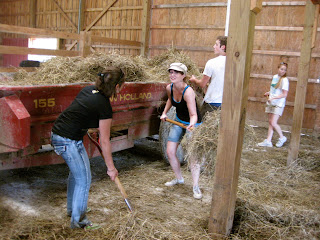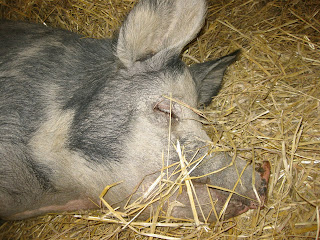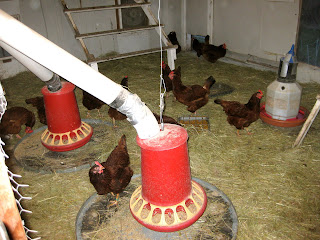I need to stop thinking so much about food. I need to stop thinking so much, in general. I know this, but it helps to be reminded. And that’s exactly what my experience this past weekend did for me—taught me to once again quiet my mind, open my heart, and just be.
From Friday, June 25th to Sunday, June 27th, the Rochester Folk Art Guild hosted a Craft Workshop Weekend, which mainly revolved around the arts (pottery, drawing, poetry, weaving, photography, music, and woodworking). But thanks to the East Hill Farm's steadily expanding array of crops—grown in part to support their fairly recent community supported agriculture (CSA) endeavor via the Good Food Collective—the Guild also offered a workshop in biodynamic agriculture. Of course, I had to be there. And because I opted to go as a work-study volunteer, it was an all-expenses-paid experience!
Quick personal note: If I could’ve found a way to swing it, I would’ve spent the entire summer volunteering on small, sustainable farms via the World Wide Opportunities on Organic Farms (WWOOF) network; that was my original plan, anyway. But for various reasons, it didn’t work out. So instead, I chose to volunteer and get the farming experience when and where I could. (Hence the recent Farm Sanctuary Saturday! post.)
So, on Friday morning, with my tent and sleeping bag in hand, I drove to East Hill Farm in Middlesex, NY (just outside of Canandaigua) for my three-day, overnight farming workshop.
First impression? Beautiful setting. The community is like something out of an antique painting—a village of custom-built houses and shops, where the community members live and work on their various crafts. And all of it nestled in the midst of rolling fields of vegetable gardens, fruit trees, grape vines, and wildflowers. Oh yeah, and a steam bath, built right next to a big swimming pond.
After a quick work-study orientation, a hearty breakfast (complete with dairy-free yogurt, gluten-free granola, and freshly picked mulberry jam!), and a long day of agriculture classes, I set up my tent in the apple, cherry, and pear orchard. It’s been a while since I’ve gone camping, and this was my first time sleeping in a tent by myself, so I have to admit, I was pretty proud of myself!
Aside from the pleasantly picturesque setting, the classes were incredible. Going into this workshop, I knew next to nothing about biodynamic farming; I just saw it as a sustainable, environmentally friendly alternative to industrial agriculture. But I was fortunate enough to have Nathaniel Thompson, who owns and operates Remembrance Farm—a biodynamic, organic vegetable farm in Trumansburg, NY—as my teacher, and now, I know quite a bit.
I won’t go into full biodynamic detail here, but I will share one truly beautiful aspect of this agricultural method: its acknowledgement of the need to plant and harvest in harmony with the natural world—its rhythms, cycles, and energies—in order to truly nourish the body and spirit with the foods produced.
Typically, when I think of organic produce, I focus on the chemical-free aspect of it. But with biodynamic farming, painstaking attention is paid to the health and vitality of the soil out of which the plants will grow. The basic idea is that the more energetic and nutrient-rich the soil, the more vibrant and nutritionally satisfying the produce.
In short, interesting stuff.
And thanks to East Hill Farm, I came home with a bag full of freshly picked rainbow bright variety swiss chard, sugar snap peas, and beets. We’d been eating swiss chard all weekend, but still, I prepared it as part of a stir-fried vegetable medley for dinner last night. I’m a little embarrassed to admit that prior to this past weekend, I had never in my life seen nor tasted swiss chard, especially not these lovely specimens of pink, orange, yellow, and green goodness—one of the most beautiful vegetables I’ve ever seen. Yum!

Over the weekend, I had so many wonderful experiences—connecting with open-minded, warm-hearted individuals from all over; eating freshly prepared, home-cooked meals; singing underneath the stars by the campfire with some incredibly talented folk musicians; and sitting at the feet of a remarkably wise and insightful farmer/teacher.
But the thing I love most of all, once again, is that I was reminded of the importance of just being. Quiet the mind, open the heart, and just be.
Oh, and while I didn’t join in the skinny-dipping, I did go for a swim. Sigh. I already miss that place.
And now, for your contemplative enjoyment… The following is a quote from Rudolf Steiner, the Austrian physicist in the early twentieth century whose essays and lectures set the foundation for modern-day biodynamic theory and practice (emphasis mine):
“Nutrition as it is today does not supply the strength necessary for manifesting the spirit in physical life. . . Food plants no longer contain the forces people need for this.”
And finally, what's your favorite smoothie recipe? I've been making one every morning for the past week or so, and I must say, I feel so energized after drinking it! My current fave is mango-banana-blueberry-flaxmeal... but I'm open to suggestions!






















































